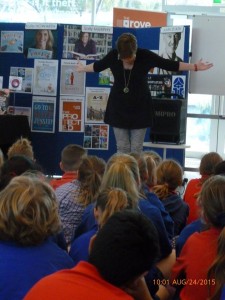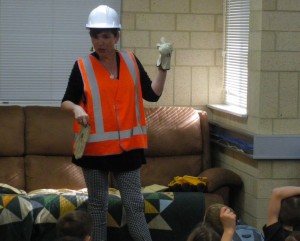Yesterday I shared ten tips for successful author visits aimed at teachers and librarians (you can see that post here). Today, I want to share another ten, but this time aimed at presenters. Visiting schools and libraries can be lots of fun, and also form an important part of your income stream. I’ve done lots and lots of these visits, and the following tips are some of the things I’ve learnt along the way.
1. Advertise your availability. If you want to do school and library visits, you need to let schools and libraries know you are available. List on your website (you do have a website, don’t you?). You can als o create a flyer and distribute it by mail, or at conferences you attend. Word of mouth is also a wonderful tool.
o create a flyer and distribute it by mail, or at conferences you attend. Word of mouth is also a wonderful tool.
2. Be upfront. It is easier to discuss payment and conditions at the time of the booking, than it is on the day you turn up, or after the event. State your rates, how many sessions you will do in a day, audience size, age groups you can cater for and so on. Talking about money can be uncomfortable, but it is necessary, which leads me to number 3:
3. Charge for your visit. With few exceptions, you should ask for ASA Rates for your time. An author/illustrator visit is an educational experience for children and helps teachers and librarians to motivate kids to read/write/draw. The rates may sound high when you’re starting out, but trust me you will earn them – it is a lot of hard work(fun, but also exhausting).
4. Be aware of the difference between promoting your book and promoting literacy. If your visit is in school time, it should be more than just a sales pitch. You are being paid for your time, so make sure you are giving value for students and for teachers. What are children going to learn from you – it might be something specific to your book, or about books and reading more generally.
5. Prepare your presentations. Work out what you have to say and how you are going to say it. A ‘meet the author’ session, for example, might include a reading of your book (or part of it), a talk about the research or creative process, and time for questions. If you’re an illustrator, you might show how you drew the main character. A writing workshop might teach a specific writing skill. Think about your own skills, the book, and the target age groups.
 6. Have props or visuals. Kids like having things to look at. Some presenters use Powerpoint presentations, which can be wonderful when used well. A good one will be high on pictures and low on text. other props could be puppets, costumes, historical artifacts, you name it.
6. Have props or visuals. Kids like having things to look at. Some presenters use Powerpoint presentations, which can be wonderful when used well. A good one will be high on pictures and low on text. other props could be puppets, costumes, historical artifacts, you name it.
7. Know what you are going to say. This is kind of like 4 above, but this time I’m talking about knowing your presentation. Don’t read from a script or written speech, and certainly don’t read a Powerpoint. If you are nervous, practice. A lot. In front of a mirror, in front of friends, in front of your cat. Use your rehearsals to work out timing, remembering timing can be affected on the day by your nerves, by interruptions and by questions.
8. Be flexible. Be prepared for curve balls. What will you do if the Powerpoint doesn’t work? What will you do if you leave your book at home? What will you do if Johnny in the front row farts or – worse still – throws up? I was once booked to run a writing workshop for 20 kids. On the day 80 kids came into the room – and not one of them had anything to write with. Be prepared for misbehaviour. It won’t happen every time, but remember you are dealing with schoolchildren and, as such, kids will misbehave. They might call out, or talk when you are talking, or throw things at you. How are you going to respond? It is good to remember that the teachers should be there in the room and you can ask them for help in this area, but it is great if you can avoid interrupting the class to do this. I try not to expect perfect behaviour, and only stop my presentation if the behaviour is affecting other children’s ability to see or hear me.
9. Use prizes/rewards. Small giveaways such as bookmarks are very popular. Of course, if you are a softy like me, you might find it hard to give away only one or two, particularly for younger children. I tend to have a few things on hand in case someone comes up with a particularly brilliant question or answer, or if I need a volunteer top help out with something.
10. Follow up after the visit. Ask the person who booked you for a few words of written feedback via email. Take the time to thank them for having you. Also take the time for yourself to think about what did and didn’t work well – and why.
Have I missed anything? If you have any tips for school visits, I’d love to hear them. Leave a comment.
great articles Sally and perfect timing. Im doing a school for book week and am so rusty i need all the advice i can get. Hope your visits go well!
Thanks Lara. I am sure you’ll be brilliant. Good luck!